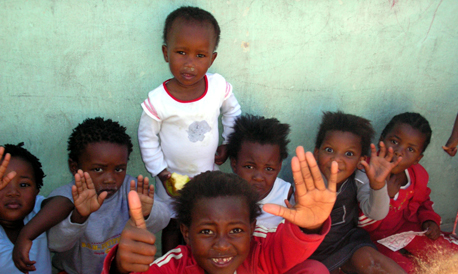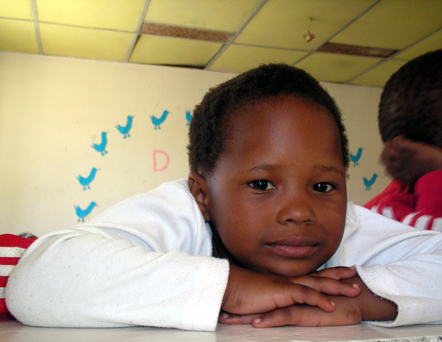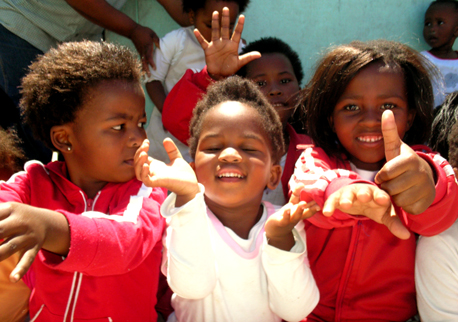
Pre-school education remains the privilege of a few
Giving a child as early a start as possible in formal learning is crucial to success at school, work and in life. Spending by government reveals it is not a priority, writes Staff Reporter Melinda Fantou.
The smiling, disciplined children, all in bright red uniforms, sit patiently in their chairs as their caring teachers watch over them in the freshly painted classroom.
Thembani Pre-School in Khayelitsha, established in 1988, is the nurturing environment that Evelina Sidinile, 72, has created for her young charges, for whom this first step on the ladder of education is critical.
Sidinile is one of the thousands of women throughout South Africa who are making a considerable contribution to helping young South Africans make their way through life.
And she is justifiably proud of her achievement. From humble beginnings, the school, situated on the edge of sprawling shacklands, today has about 80 pupils, aged from three to six.
The school comprises a 40 square metre classroom, with a smaller room attached. While it may not be much compared to better-resourced schools in wealthier areas, for the parents of the pupils at Thembani, it is a godsend.
The need is great and Sidinile says they find it hard to turn away new pupils.
"We accept more and more children because parents need to go to work," she says. "We can't refuse children because we want to keep them off the streets."
Sidinile has even turned her house, which is next door to the school, into a crèche. In her garage, 20 babies crawl on the carpet, waiting for their parents to pick them up after work.
Her kitchen is used to prepare food for the children, while her lounge doubles as the school office.
"Here most people have no job, no money, no nothing. But they like education and want their children to be educated," she says.

It is people like Sidinile who are helping to make a difference. Only about 55 000 of the Western Cape's 80 000 children have access to Grade R education. For many parents it is too expensive and often too far from their homes.
And when it comes to children under six, enrolment in Early Childhood Development sites drops drastically.
David Shepherd, director of institutional management and governance planning in the education department, says that national government policy is for every five-year-old child to have access to a quality Grade R site by 2010.
"It won't be compulsory, but it will be universal. Everybody will have access."
Twenty years ago it cost parents R7 a month to send their children to Thembani school. The fee has now risen to R80 a month.
"We have about 11 children whose parents can't afford to pay the fees," says Sidinile.
"We know they don't tell stories so we keep their children anyway," she says, adding: "Other parents, when they can no longer pay the fees, prefer taking their children back home for a few weeks until they can pay again."
The school fees enable Sidinile to pay the teachers salaries of between R500 and R900 a month.
"It's the only resource we have. The government doesn't give so
much help. It only supports 23 children through grants," she says. "I
struggle for everything."

Sidinile is the only person at the school with any formal teacher training, while the eight caregivers are mothers from the neighbourhood. The result is that very little actual teaching takes place and, in effect, the school offers mainly child minding.
Sidinile says her dream is that the school will one day be able to afford to send its staff for formal teacher training.
For most of the teachers, who would be unemployed if not for their posts at Thembani, the opportunity to work is a lifeline in a community where many residents are jobless.
But what the teachers would like is for "someone to explain how to educate the children", says Ntombizanele Magadla, who has worked at the school for over three years.
"We have had good teachers, but once they were trained they left to create their own crèche and we are left with nothing," she says.
Just how little actual teaching takes place is clear from the school's programme: 7am welcome, 8.30am inside activities, 10am tea time, 11.15am break time, 11.45am lunch time, 12.45pm prepare for rest, 1pm rest and quiet, 2.30pm tidy up, 3pm afternoon snacks, 3.15pm story time, 3.30pm prepare for home time. In effect, only two hours are dedicated to any form of teaching.
Sidinile nevertheless believes she "teaches them a lot" during those two hours. "We teach them numbers, colours, shapes."
But the school is also hampered by a serious lack of materials and teaching aids. No pens to write numbers with, no paper to draw on. And while she dreams of offering her young charges a quality education, Sidinile is nevertheless pragmatic.
"What worries me most is that we have no real kitchen, no office and no room for when the children get sick. We need to sort that out first," she says.
"That's how we can raise the school to better standards. What would a child learn if his stomach is empty? It's been over three years that I'm holding a plan to build a kitchen but the money isn't coming in."
The Department of Education acknowledges that the growth of one in four children under the age of six in the Western Cape is stunted by long-term malnutrition. And one in eight children dies before his or her eighth birthday.
"That's why we have to remember that ECD development is not only about giving education, but also about giving all the necessary conditions to children to be able to learn," says Shepherd.
But not enough is being done, says Eric Atmore, national director of the Centre for Early Childhood Development.
"The government is much more concerned, but in my opinion it is implementing the incorrect strategy because it is the cheapest one."
Atmore argues that teachers should be employed by the provincial education authorities.
"Provincial government doesn't want to follow this scheme because they are still not giving ECD priority. They are transferring financial responsibilities on to poor parents.
"Eighty-eight percent of adults working with children are not trained or are inappropriately trained. We would get better quality if all teachers were hired by the province."
Shepherd says the problems are largely caused by a lack of money, adding that the situation is "desperate".
"We simply couldn't afford to hire teachers for children under the age of six. Our ECD plan is financed through a national scheme."
But while R320 million is needed in the Cape alone, the department's budget is around R72 million, representing 1% of the whole budget of the education department.
"That's why we are mainly focusing on Grade R and increasing resources for the very poor areas."
But Atmore thinks that the 1% allocated to ECD shows the lack of commitment from the government.
"How can you make ECD a priority with only 1%," he wonders? Atmore admits that efficient policies would only show results in 12 years' time when children entered the job market.
"But somehow policy-makers don't want to wait that time and don't see the economic benefits of funding ECD."
Atmore agrees that giving priority to Grade R is a "good thing" but for him "it's already too late".
"Children have to be educated earlier so they can have a chance to develop normally," he says.
"Fewer than half of Western Cape Grade 3 pupils are up to scratch in literacy and numeracy, with some not even at Grade 1 level. It is hard to believe that most of the schools in the poor areas don't even have a book corner. And when they have got one, the works of Shakespeare or a Spanish to English dictionary are the only books available."
And yet, despite all the problems that Sidinile must face on a daily basis, Thembani is one of the more fortunate schools as it has access to water and electricity, and a toilet.
"ECD has been built by the work of poor women, women from the community who saw the need to keep those children in a safe place," says Atmore.
"They did a hell of a lot of work. And there's so much more to be done now. What we need is political commitment."
melindafincape.co.za
Link: http://www.capeargus.co.za/index.php?fArticleId=3054473